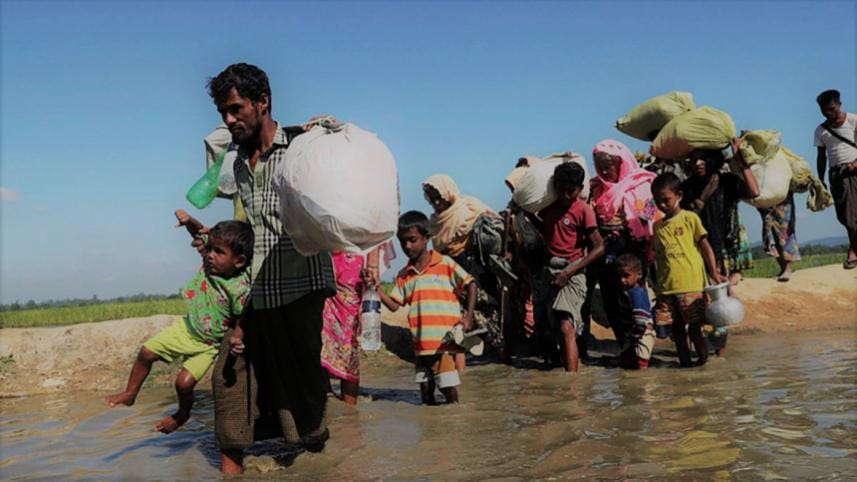Rohingyas facing 'slow death' in Rakhine: report

Rohingyas are being subjected to "slow death", a genocide tactic, in Rakhine by the Myanmar military amid a raging war between the junta and its proxies and the Arakan Army, says a new report.
The report published by the Burmese Rohingya Organisation UK (BROUK) on Wednesday said the Myanmar military has forcibly recruited Rohingya men and youth by abducting them from their homes, villages, markets, some during night raids and often at gunpoint.
"Once conscripted, Rohingya have been subjected to forced labour and cruel, inhuman, or degrading treatment, then sent to the frontlines in Rakhine State to be used as cannon fodder," said the report.
"The regime's treatment of forcibly recruited Rohingya may constitute the genocidal act of causing serious bodily or mental harm to the members of the group," it added.
Rohingya remaining in Rakhine State face either a fast death being killed by the Myanmar military or Arakan Army, or a slow death as a result of being systematically deprived of the basic necessities of life, said Tun Khin, president of BROUK, in a statement.
When such genocidal acts are going on, the UN Security Council looks on and does nothing. It has again failed to uphold provisional measures ordered by the International Court of Justice four and a half years before to prevent the acts of genocide against the Rohingya, he said.
As a result, in the past six months alone, hundreds if not several thousands more Rohingya have been killed, the report added.
All 600,000 Rohingya left in Rakhine State continue to live under wide-ranging repressive laws and policies. This includes 140,000 Rohingya who have been confined to camps since 2012 and are living under a state of indefinite arbitrary detention.
According to the report, the Myanmar military is perpetrating the genocidal act known as 'slow death', which involves deliberately inflicting conditions of life calculated to bring about physical destruction in whole or in part of the Rohingya group.
"This includes the deliberate deprivation of resources indispensable for survival – namely adequate food, water, shelter, sanitation and medical care – by the military regime.
"The severe restrictions on freedom of movement imposed on the Rohingya underpin this act. They also leave Rohingya extremely vulnerable during times of armed conflict."
During the period of this report -- 13 November 2023 – 23 May 2024, the Myanmar military, its proxies, and the Arakan Army are also alleged to have committed war crimes against Rohingya communities.
The report warns that the international community cannot afford to fail the Rohingya yet again.
It calls for concerted international public pressure for an open meeting of the UN Security Council to frankly discuss the regime's repeated breaches of the ICJ's provisional measures order.
All relevant organs of the UN must make consistent efforts to leverage the ICJ's provisional measures order within their own mandates, to seek urgent protection for the Rohingya, it said.
"The Rohingya genocide was not inevitable, it was allowed to happen and is still being allowed to happen," said Tun Khin.



 For all latest news, follow The Daily Star's Google News channel.
For all latest news, follow The Daily Star's Google News channel.
Comments